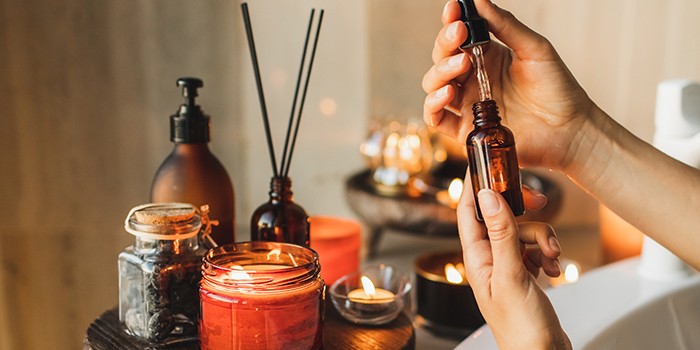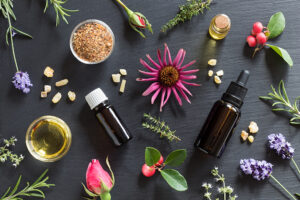Though professional medical help should always be sought when experiencing anxiety symptoms, many find relief using natural solutions like getting more rest, cutting out sugar and refined carbs from their diet, restricting caffeine intake and practicing mindfulness meditation.
Herbs and essential oils may also provide assistance; specifically l-theanine found in green tea can reduce acute stress while improving sleep. And studies demonstrate the calming benefits of lavender, rose and citrus-based scents like bergamot.
1. Aromatherapy
Essential oils have long been recognized as an effective means of relieving anxiety and stress. An essential oil is a liquid extracted from flowers, herbs or trees and contains cells responsible for producing their aromatic scent – these cells can then be inhaled or applied topically – like Chamomile Oil which has an aromatic herbal scent to aid relaxation and promote sleep, while Clary Sage Essential Oil has also been shown to decrease stress and anxiety levels.
Anxiety is a normal part of life, but when it interferes with everyday activities it becomes an issue. Consulting a counselor or taking anti-anxiety medication can help alleviate symptoms; additionally incorporating natural remedies like weighted blankets can ease anxiety by helping the body relax before bedtime.
2. Meditation
Meditation can help calm both mind and body, helping reduce anxiety levels by relaxing both. Though learning meditation takes some practice and dedication, its power lies in its potential ability to reduce stress levels.
At times, anxiety can be normal; however, when it becomes frequent or severe it may signal an anxiety disorder like panic disorder or generalized anxiety disorder. A mental health therapist can assist in diagnosing the source of your distress as well as provide effective solutions – including natural remedies that could aid recovery.
Natural remedies may provide effective alternatives to traditional therapies; however, they should always be used under professional guidance and with caution. To find an anxiety relief method that is right for you, speak to a mental health provider and explore multiple solutions until one works perfectly for you.
3. Acupuncture
Acupuncture needles can provide relief for various conditions, including stress and anxiety. Studies show that it increases brain release of feel-good hormones while simultaneously decreasing stress-inducing cortisol and epinephrine.
Acupuncture may help relieve chronic pain, fibromyalgia, headaches and migraines as well as neck and back pain, sinusitis allergies gastroesophageal reflux disease (GERD) digestive disorders as well as infertility.
If you find yourself experiencing frequent and uncontrollable anxiety or are concerned about your mental health, speak to a doctor immediately. Anxiety can often be treated through therapy and antianxiety medications; any natural remedies, including dietary supplements or acupuncture should also be discussed with healthcare provider as they could interact with certain antianxiety drugs and ensure you get maximum benefit from treatment. It’s also important to inform them if taking other medications – they will ensure you are getting optimal care from their treatment plans.
4. Yoga
Anxiety is a prevalent concern in our fast-paced and always-connected world. According to the 2021 State of Mental Health in America Report, anxiety has skyrocketed during the COVID-19 pandemic, so finding effective strategies to combat it has never been more necessary.
One effective method for doing so is through yoga. Yoga helps relax both body and mind through breath work, which helps normalize heart rate and breathing patterns while relieving physical tension such as that found in psoas muscles that connect directly with the diaphragm and may tighten when under stress.
If you’re experiencing chronic anxiety, it’s wise to consult a healthcare provider regarding treatment options; such as cognitive behavioral therapy and anti-anxiety medication. Natural remedies for anxiety relief may also provide some relief from symptoms.
5. Massage
Anyone who has experienced the joys of massage knows it to be deeply relaxing and pleasurable experience – but did you also know it can also be used as an effective means to alleviate anxiety and stress?
Physical and mental stress can result in muscle tension which in turn causes discomfort, leading to more stress levels which increases again the discomfort experienced – creating a vicious cycle.
Massage can help both physical and mental stress by lowering heart rate, decreasing muscle tension, and releasing feel good hormones. Furthermore, massage stimulates lymphatic drainage to remove metabolic waste from muscle fibers which contributes to fatigue and weakness as well as emotional stress.
6. Exercise
Anxiety is the world’s leading mental health condition. If you experience occasional or persistent anxiety symptoms, or are diagnosed with an anxiety disorder, natural remedies and holistic therapies may help reduce symptoms and help restore equilibrium in the mind and body.
Exercise can be an excellent natural stress reliever that boosts both mood and energy levels, improves sleep quality, and increases self-confidence.
Focus on how your body feels while exercising, paying close attention to how breathing goes and noting any tightness or tension in muscles – this mindfulness practice will make your workout even more productive!
7. Sleep
Sleep can be an invaluable way to ease anxiety symptoms. Achieving adequate amounts of quality rest can help you remain focused, reduce heart rate and calm nerves throughout the day.
Chamomile and lavender can help you unwind before bedtime with soothing herbs like chamomile and lavender, both natural sedatives that have anti-anxiety benefits that can be taken in tea form or essential oil form. A soothing oil such as Roman Chamomile can also be applied directly onto wrists or neck to bring peace during the day.
Studies show that lack of sleep can amplify anticipatory anxiety by stimulating regions of the brain associated with emotional processing. Luckily, taking some simple steps such as cutting back caffeine intake, exercising regularly, mediating and getting sufficient restful sleep may go far toward helping manage anxiety symptoms.




